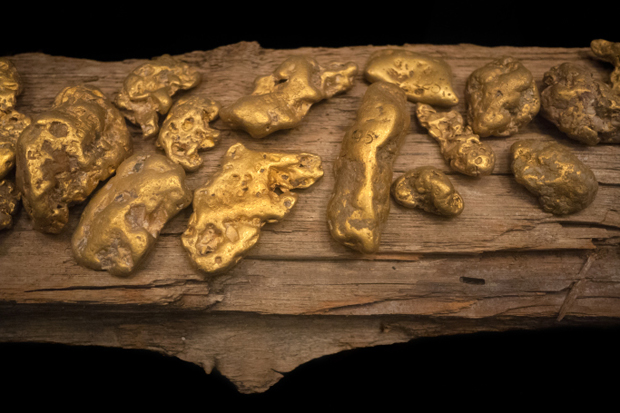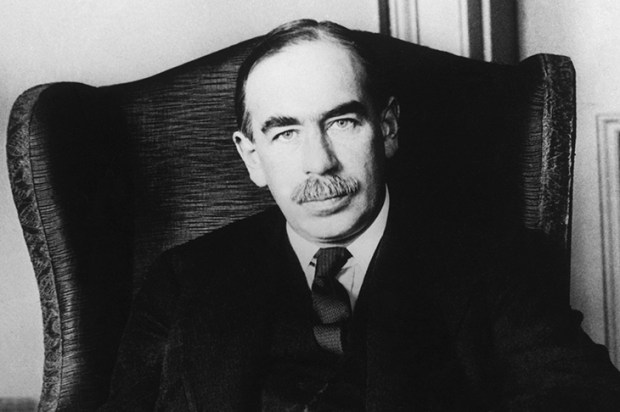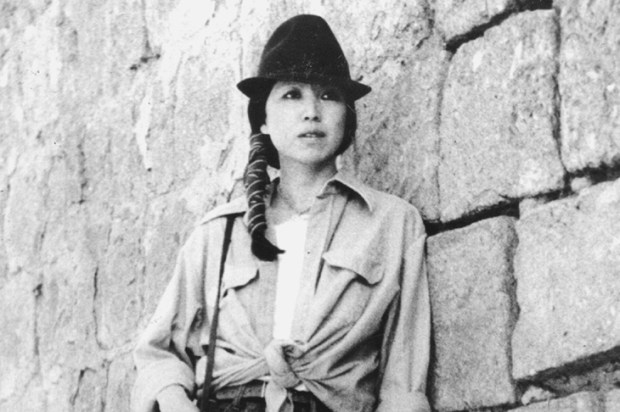In 2008, the price of gold lofted above $1,000 an ounce for the first time in history, inspiring a rush of small-scale panners to head for the diggings with hope in their hearts. As the price of the metal fell and rose again — it nearly touched $2,000 an ounce in 2011 — journalist Steve Boggan contracted a touch of gold fever himself. He set off for California to find out who these chancers were. And to find some gold.
I’ve taken Route 49 through inland California — Coloma to Sonora. The largely empty highway, which slices through heartbreaking landscape, is named of course after the fabled ‘Forty-niners’, and you can still smell, in those small towns with their jails and saloons and crummy hotels, the romance of possibility, the human capability to bet against all odds.
Boggan, whose first book was Follow the Money: A Month in the Life of a Ten Dollar Bill, has produced a lively narrative history of those heady days, when tented camps rose and fell and cholera prowled. The people who made money were those mining the miners: an eating establishment in one camp charged a dollar for a slice of bread, and two dollars if it was buttered (equivalent to $60 today). Boggan quotes judiciously from the sources.
He is, however, more interested in contemporary panners. Gold Fever includes a series of biographical sketches of the oddballs and drifters that he meets on the trail. He sucks down beers with them at some lonely RV camp after another failed day panning the creeks, and lards his prose with direct speech as his new friends tell their stories. This book would make a wonderful television film.
The reader follows our man from camp to camp as he pursues the gold trail in a rented four-by-four. Most of the action takes place close to the California Mother Lode, but in one dramatic episode Boggan goes dredge-mining in the Rogue river in south-west Oregon, plunging in with a wetsuit, suction hose and respirator. Disaster very nearly ensues. Elsewhere, on a 2,000-mile, two-month odyssey, he learns dutifully about the practicalities of panning.
‘Looking for gold,’ he acknowledges, ‘is no more complicated than playing the lottery. You know the odds are stacked against you, but you buy a ticket anyway.’ The psychological aspect of the chase recurs again and again; it fascinated the author. Boggan describes his new friends with warmth and affection. But he can see that they are mostly losers in life’s game, all too often in addictive thrall to the glimpse of sparkle in the racings.
This is a fun book, but it is a sad one. Gold fever, Boggan concludes, is ‘fascinating and tragic in equal measure’. Some of the modern-day miners described the hit of finding a nugget as ‘spiritual’. Boggan finds a lot more meaning in what he calls ‘the darker symptoms’ of addiction, when life shrinks to a quest for the next high. Abandoning home to search for a bit of yellow metal is like smoking crack cocaine: ‘One inhalation and your life changes forever.’
Boggan is a hugely likeable companion, but as a writer he displays the journalist’s weakness for cliché: news ‘wreaks havoc’, and so on. Cultural references are lowbrow — one learns that Mark Twain ‘wrote entertainingly’. But it doesn’t matter. This book is a romp, and the author positions himself in the good old English tradition of bungler, putting his tent up inside out and generally getting into scrapes. His stories are laced with self-deprecation.
This is a very different book from Matthew Hart’s 2013 Gold: The Race for the World’s Most Seductive Metal. The two volumes complement one another. That said, there are insights in these pages into the business of gold. I was astonished to learn how rare it is. All the stuff ever found, according to Boggan — just 190,000 tons — would fit in a medium-sized oil tanker.
I wasn’t convinced by Boggan’s personal gold fever. Nor is he. ‘Had I become bewitched by the beauty of gold and blinded to its true value?’ he asks himself. ‘And what was its true value anyway, if a man might achieve happiness by moving one fifth of a ton of earth and finding one flake worth just a few pennies?’ Indeed. He panned a little bit of gold. But that wasn’t the point.
Got something to add? Join the discussion and comment below.
Get 10 issues for just $10
Subscribe to The Spectator Australia today for the next 10 magazine issues, plus full online access, for just $10.
Available from the Spectator Bookshop, £12.99 Tel: 08430 600033
You might disagree with half of it, but you’ll enjoy reading all of it. Try your first month for free, then just $2 a week for the remainder of your first year.














Comments
Don't miss out
Join the conversation with other Spectator Australia readers. Subscribe to leave a comment.
SUBSCRIBEAlready a subscriber? Log in